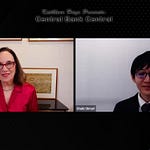Ayhan Kose, the World Bank’s Deputy Chief Economist, is growing more optimistic on the odds of a continued decline in global inflation as the numbers continue to move in the right direction. “The news on the inflation front, I would say, has been very good so far. “
It’s important to note that Ayhan has not been quick to join the “inflation is falling, central banks can cut rates now” camp this year. Back in April he warned that widespread expectations for Fed rate cuts were being undermined as U.S. as services prices rose and the labor market remained strong. In June he warned that stubborn inflation meant global central banks’ “higher for longer” interest rate policies would be a curb on growth in emerging market economies as it would make it harder for them to provide stimulus by cutting their key policy rates.
Now Ayhan sees the big inflation picture definitely looking much better. “Think about it,” he says. “In July 2022 we had global inflation close to nine-and-a-half percent, and last month we got a level less than three percent.” He notes that more than 90% of countries now have inflation lower than where they had it two years ago, aided among other things by falling commodity prices. Core inflation should keep declining as sticky services prices ease.
Growing more optimistic on falling global inflation, however, is not the same being confident this welcome trend will continue.
”What could derail all of this?,” Ayhan asks. “There are serious upside risks to inflation we need to keep in mind.”
”I think the first risk is geopolitical tensions: they could create inflationary shocks,” he says. “They can increase oil prices or they can… disrupt logistics, oil production. All of these things could basically translate into inflationary pressures.”
”So far we have not seen, for example, the conflict in the Middle East having a significant impact on prices, but that can change if that conflict escalates,” he adds.
Ayhan says central banks will also remain cautious as so many still face inflation that remains above target: 40% of all countries around the world, and about 50% in advanced countries. He says they will be alert to the upside risks to inflation “because if these risks materialize that will basically be a very serious hit to their credibility.”
As for what falling inflation means for interest rates, we also dove into a research paper Ahyan co-authored for the ECB’s Sintra conference in July on Rate Cycles - the first systematic, cross country of interest rates over about 55 years for 24 advanced countries. to get an historic perspective on tightening and easing cycles.
In terms of the current pandemic and post-pandemic rate cycle, I asked him, where are we now?
”I think inflation is coming down, labor markets are weakening, we are expecting economic activity to slow,” Ahyan says. “So this is…the type of ground where interest rates need to come down a it. The big question is…where are we in the context of real interest rates . As inflation is coming down, and you keep policy rates high, real interest rates will edge higher and higher.”
Bottom line: what does all of this mean for emerging markets, for the nations the World Bank is committed to helping with every area of economic development, in what includes the poorest countries on the planet?
Ayhan sees a net positive for emerging markets. “We think there is a global soft landing…this is still our baseline scenario of a good outcome for emerging market economies. And then interest rate cuts in the U.S. that will provide a little bit of room for some of them to reduce interest rates as well.”
At the same time, going back to his Rate Cycle research, he says interest rates will remain high relative to where they were prior to the pandemic, especially compared with the two prior decades when rates were so low. “So we are not going back to these low interest rates quickly.”
And this will be tough for “emerging market economies, frontier markets, some lower income developing economies that have accumulated significant amounts of debt over the past 15 years,” Ayhan says. “Servicing this debt is going to be a challenge.”
”So in an environment, interest rates are coming down, but still remain high, growth possibly weaker, they (will) need to be very flexible in terms of fiscal policy especially and how they think about structural reforms,” he adds.
Here’s more about Ayhan and the work he has done over the years which enable him to connect the economic and monetary policy dots from the Fed to central banks around the world.
Ayhan Kose is the Deputy Chief Economist of the World Bank Group and Director of the Prospects Group. He is a member of the Chief Economist’s leadership team overseeing the Bank’s analytical work, and policy and operational advice. He also leads the Bank’s work on the global macroeconomic outlook, financial flows, and commodity markets. Under his management, the Prospects Group produces the Bank’s flagship reports Global Economic Prospects and Commodity Markets Outlook, in addition to other policy and analytical publications. Prior to joining the World Bank, he was Assistant to the Director of the Research Department and Deputy Chief of the Multilateral Surveillance Division in the International Monetary Fund (IMF). He served in a wide range of roles supporting IMF’s analytical, policy, and operational work.
Mr. Kose has written extensively on international macroeconomics and finance. His articles have been published in leading academic journals, including the American Economic Review, International Economic Review, Journal of Monetary Economics, Journal of International Economics, Journal of Development Economics, and many others. His latest book, Falling Long-Term Growth Prospects (co-edited), examines the evolution of global potential growth and its underlying drivers. His recent policy work focuses on global inflation, debt challenges, and business cycles.













Share this post